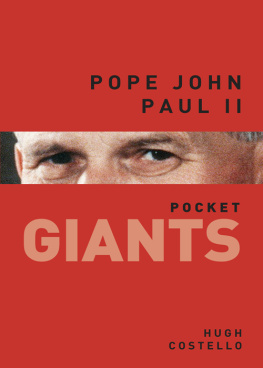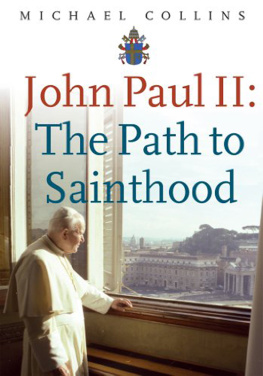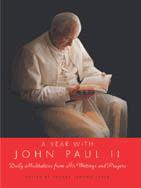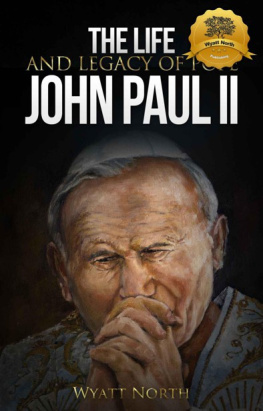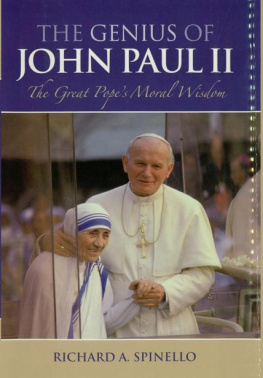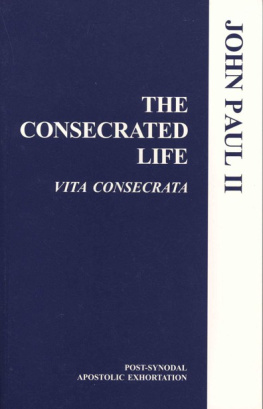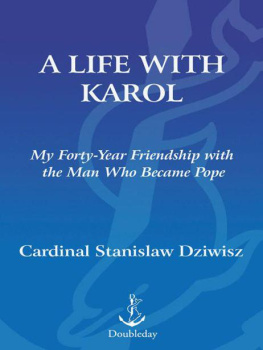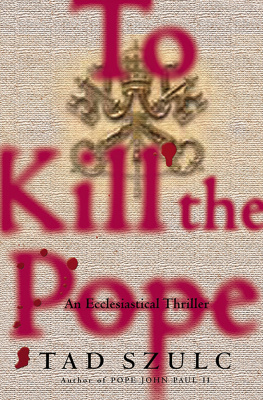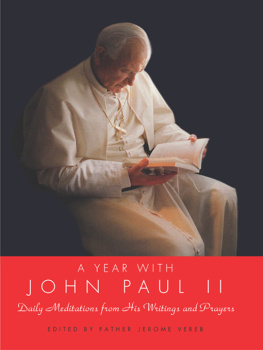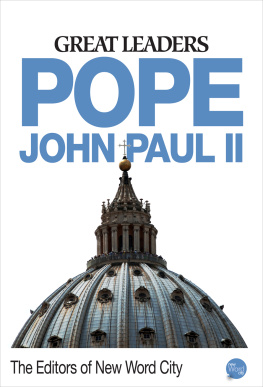Contents
1
A Revolutionary Pope
The Italians have a word for it: papabile. The literal English translation is popeable. A more helpful interpretation is electable. The man who is papabile is believed by his fellow cardinals to possess an elusive blend of personal qualities authority, holiness, forbearance that together equip him to take on the most demanding, and frequently most thankless, of jobs.
Over the centuries, many holders of this unique office have struggled to convert those pre-election papabile virtues into effective leadership of the worldwide Church. The majority have been sincere and capable figureheads; but others have proved spectacularly ill suited to the role. There have been vain popes, libidinous popes, ignorant popes and inept popes. Some have been downright corrupt, exploiting the office for their own distinctly unspiritual ends. Others have begotten chaos or presided helplessly over decline. Many, crushed by the weight of expectation, have simply subsided into inertia.
Every so often, however, a figure has ascended to St Peters throne who has delivered on the promise he showed as a cardinal. These men have not pleased everyone (an impossible task for any pope), but they have demonstrated unquestionable qualities of leadership and vision. They have been true helmsmen, guiding the Church through hostile times and keeping it vital and relevant in the face of sometimes forbidding odds. Among these figures was the eleventh-century Pope Gregory VII, who stood up to state power and cemented the Churchs primacy in medieval Europe. The controversial Pope Pius IX or Pio Nono as he was known in Italian masterminded a resurgence in Catholicism in the nineteenth century. Another remarkable figure was the avuncular Pope John XXIII, who reigned for just five years (195863) yet began a series of reforms that radically overhauled the faiths relationship with secular society. These men could truly be said to have changed the world.
Another such figure, and one of the unlikeliest, was a little-known Polish prelate. In October 1978, when the College of Cardinals met to elect a pope for a second time in just two months, Karol Wojtya, the Archbishop of Krakw, was not widely considered to be papabile. The college had recently elected one obscure figure: Albino Luciani, Pope John Paul I, who reigned for barely a month before his sudden (and some believe suspicious) demise. The College were hardly in the mood to choose another wild card. The expectation this time was that they would elect a senior figure from within the Curia, the administrative and political establishment of the Roman Church.
For reasons of factional infighting and ideological division (outlined in more detail in Chapter 5), the cardinals failed to give decisive backing to either of the main contenders. Since no conclave can break up without choosing a pope, a third way was required. Out of the pack emerged Wojtya, the first non-Italian pope in 450 years. As a tribute to his late predecessor, he took the name John Paul II.
There were some who feared that Wojtyas obscurity and his lack of a broad base of support prior to his election would undermine his authority as pope. How emphatically wrong they were. John Paul II revolutionised the office and dragged it into the modern age. In the process he became a global phenomenon. Where previous popes had barely featured in the mainstream media for years on end, John Paul II was rarely off the news pages. His relative youth he was 58 when elected meant he would have time to mould the Church in his own image and leave a legacy that might be sustained for generations. This he achieved with vigour and charisma, but at a cost.
His reign one of the longest in papal history was marked by controversy and division. John Paul II became a bte noire in the eyes of liberals for his staunch refusal to allow contraception or to reconsider the Churchs position on priestly celibacy and the ordination of women. But for others he was a Churchillian figure who took on the forces of godlessness and moral relativism. He gained a stature that left secular statesmen in his shadow. It is these qualities that make John Paul II a worthy subject for this book. He is an enduringly fascinating figure not despite but because of the strength of feeling he inspired and continues to inspire both among his legions of admirers and his armies of critics.
Karol Wojtya was unquestionably a man of intelligence, a gifted theologian and philosopher who also had the ability to communicate complex ideas in plain language a rare combination even among democratically elected public figures. He took over an institution reeling from the loss of influence it had suffered in post-war Europe and the United States. His immediate predecessors had remained immured in Vatican City, showing little apparent interest in an increasingly diverse world outside. John Paul changed all that. He had a message and he was determined to deliver it personally. If the world had stopped listening to the Vatican, he believed, maybe it was time for the Vatican to increase the volume.
He was uniquely suited to the task. Handsome, charismatic, energetic, he bore no resemblance to the often remote and desiccated figures who had traditionally held the office. Where they had kept the world at arms length, he embraced it; where they had located the epicentre of faith in the confines of the Holy See, he set out to discover it in the hearts and minds of every individual believer, whatever benighted corner of Gods earth they lived in. This difference of approach was encapsulated in his trademark gesture: where earlier popes would extend an imperious ringed hand to be kissed by the supplicant, John Paul got down on his knees and kissed the ground in each new country he visited. As a signifier of humility and openness it was hugely effective; as a visual motif, a photogenic moment for an image-hungry mass media to capture and disseminate, it was beyond compare.
There were, of course, other reasons for Wojtyas rapid rise to global prominence. Here was a man who had lived most of his life under totalitarian regimes. The Cold War was not, for him, some theoretical construct but a harsh fact of daily life. At the time of his election in 1978, the Soviet Bloc was still a powerful and implacable reality, but the cracks were beginning to show. In the West, a generation of leaders was emerging who would share Wojtyas conviction that the twentieth centurys Marxist experiments had run their course. Margaret Thatcher would become the British prime minister less than a year after Wojtyas election. In 1980, the hawkish Ronald Reagan won the White House. They would become John Pauls ideological soulmates, and together they were in the vanguard of events that led to the collapse of what Reagan called the Evil Empire. The timing of Wojtyas election, then, could hardly have been more serendipitous but it was the man himself, through his steely single-mindedness, who capitalised on this opportunity.
Many Catholics look back on John Paul IIs pontificate as a golden age. For others it marked a descent into autocracy and fundamentalism. His detractors, while acknowledging that he advanced the cause of freedom and made the Church relevant again, point out his failure to provide effective leadership when sexual abuse scandals rocked the institution. This failure, they argue, was consistent with John Pauls earlier refusal to show any flexibility on issues that have come to define the Churchs relationship with the modern, secular world. John Paul insisted on excluding from the sacraments all Catholics who had divorced, those living together out of wedlock and those in homosexual relationships. These doctrinaire positions, while applauded by traditionalists in the Church, alienated millions of otherwise devout Catholics.

